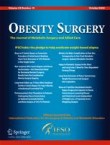
Abstract
Background
Perioperative subcutaneous tissue oxygen tension (PsqO2) is substantially reduced in obese surgical patients. Goal-directed fluid therapy optimizes cardiac performance and thus tissue perfusion and oxygen delivery. We therefore tested the hypothesis that intra- and postoperative PsqO2 is significantly reduced in obese patients undergoing standard fluid management compared to goal-directed fluid administration.
Methods
We randomly assigned 60 obese patients (BMI ≥ 30 kg/m2) undergoing laparoscopic bariatric surgery to receive either esophageal Doppler-guided goal-directed fluid management or conventional fluid treatment. Our primary outcome parameter was intra- and postoperative PsqO2 measured with a polarographic electrode in the subcutaneous tissue of the upper arm. A random effects linear regression model was used to analyze the effect of intervention.
Results
Overall, mean (± SD) PsqO2 was significantly higher in obese patients receiving goal-directed therapy compared to conventional fluid therapy (65.8 ± 28.0 mmHg vs. 53.7 ± 21.7, respectively; repeated measures design adjusted difference: 13.0 mmHg [95% CI 2.3 to 23.7; p = 0.017]). No effect was seen intraoperatively (69.6 ± 27.9 mmHg vs. 61.4 ± 28.8, difference: 9.7 mmHg [95% CI -3.8 to 23.2; p = 0.160]); however, goal-directed fluid management improved PsqO2 in the early postoperative phase (63.1 ± 27.9 mmHg vs. 48.4 ± 12.5, difference: 14.5 mmHg [95% CI 4.1 to 24.9; p = 0.006]). Intraoperative fluid requirements did not differ between the two groups.
Conclusions
Goal-directed fluid therapy improved subcutaneous tissue oxygenation in obese patients. This effect was more pronounced in the early postoperative period.
Clinical Trial Number and Registry
The study was registered at ClinicalTrials.gov (NCT 01052519).



Δεν υπάρχουν σχόλια:
Δημοσίευση σχολίου
Σημείωση: Μόνο ένα μέλος αυτού του ιστολογίου μπορεί να αναρτήσει σχόλιο.